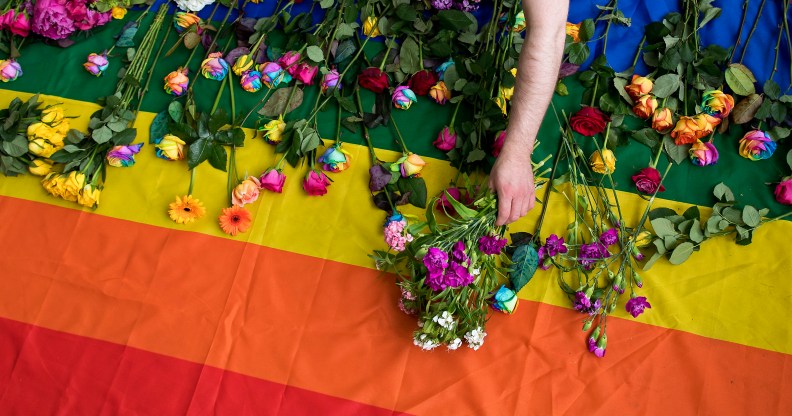Russia World Cup: LGBT safe space shut down in St Petersburg

Demonstrators lay roses on a rainbow flag as they protest over an alleged crackdown on gay men in Chechnya outside the Russian Embassy in London on June 2, 2017.
An organisation providing a safe space for LGBT fans to join together during the World Cup says it was evicted from its St Petersburg’s location a day before the football tournament began.
Diversity House, an initiative by Football Against Racism in Europe (Fare), was supposed to remain open during the duration of the World Cup from June 14 to July 15. It aimed to provide a safe space for LGBT and non-white footballs fans to watch matches.
However, the organisers told the BBC they were locked out of the building by landlords at the last minute. The owners also terminated their contract with Diversity House without notice or explanation.
According to Fare, the owners’ decision felt politically motivated.
The move was a “political attack of the kind that shows how debates about human rights are curtailed by powerful conservative political forces in Russia,” said Fare director Piara Powar on Saturday.
Fare was able to relocate Diversity House to another premise in the city, and the organisation’s similar initiative in Moscow is running smoothly.

- LGBT campaigner Alexander Agapov with rainbow flag at World Cup (Facebook)
Human and LGBT rights in Russia have been put under the magnifying glass in the run up to the World Cup.
While homosexuality was decriminalised in Russia in 1993, some laws, including the ‘gay propaganda’ law introduced in 2013, have kept members of the LGBT community from expressing themselves or getting information about sensitive subjects such as HIV.
According to a Human Rights Watch report on the laws, it’s rationale is that “portraying same-sex relations as socially acceptable supposedly threatens the intellectual, moral, and mental well-being of children.”
Because of the law, many websites providing information related to being gay, bi, lesbian or transgender were shut down or partly censored in the past five years. This includes websites such as Children 404, an online group that offers psychological support, advice, and a safe community for lesbian, gay, bisexual and transgender (LGBT) children.
Russian LGBT activists told Amnesty International in 2014 that “the gravest result of [the propaganda law] is it justifies a homophobic attitude and gives a green light to homophobic violence.”
Russia’s ‘gay propaganda’ ban and general anti-gay climate drew many fans away from major sporting events such as the Sochi Winter Olympics and the current World Cup.

- A couple kisses during Pride (DIMITAR DILKOFF/AFP/Getty)
American Outlaws, a group of US supporters that organised trips for fans to the last two men’s World Cups and the 2015 women’s World Cup, registered less interest for this year’s event than the 2014 tournament which took place in Brazil.
The main reason behind this drop in US sales is that the US team did not qualify for this year’s event.
However, many LGBT football fans from the US and the UK were discouraged from attending this year’s World Cup because of Russia’s anti-gay laws and general anti-gay climate.
“Russia has made it quite clear about its stance on gay fans, which I know gives a lot of our members and US fans concern,” American Outlaws’ head of communication Dan Wiersema told The New York Times.
A spokesperson for the Russian Football Union tried to appease concerned fans last November, saying, “You can come here and not be fined for expressing feelings,” they said. “The law is about propaganda to minors.”

